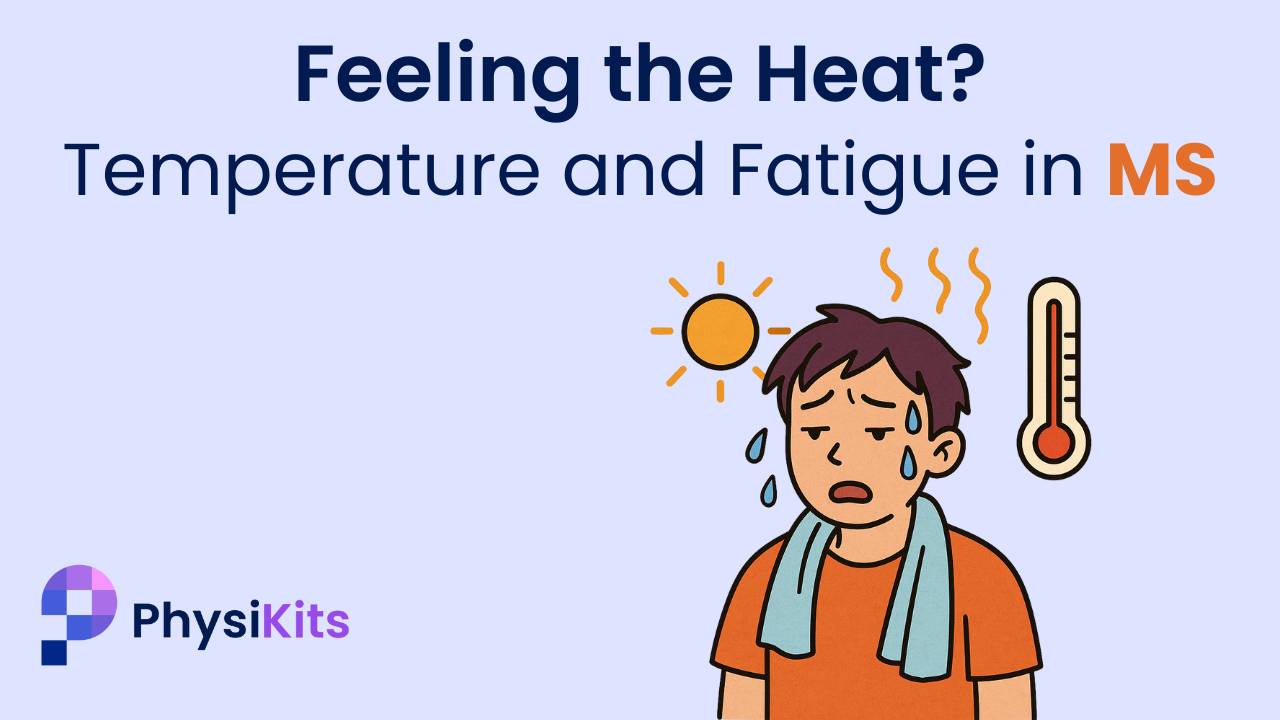
Feeling the Heat? Uhthoff's Phenomenon and Fatigue in MS
Aug 04, 2025Living with multiple sclerosis (MS) can feel like navigating a maze of unpredictable symptoms. Among these, Uhthoff's phenomenon is a common yet often misunderstood challenge, especially when paired with the ever-present issue of fatigue. If you’ve noticed your MS symptoms flare up in hot weather, after exercise, or even following a warm shower, you’re not alone. This blog post dives into what Uhthoff’s phenomenon is, why it happens, how it ties into fatigue, and practical strategies to manage both. Whether you’re searching for answers about heat sensitivity in MS or ways to combat MS-related fatigue, we’ve got you covered.
What is Uhthoff’s Phenomenon?
Uhthoff’s phenomenon, named after German ophthalmologist Wilhelm Uhthoff, describes a temporary worsening of MS symptoms triggered by an increase in body temperature. First observed in the late 19th century in patients with optic neuritis (inflammation of the optic nerve), it’s now recognised as a hallmark of MS and other demyelinating diseases. Unlike a true MS relapse, which involves immune-driven inflammation and lasts days to weeks, Uhthoff’s episodes are short-lived (less than 24 hours), reversible, and tied to heat-related triggers.
Common triggers include:
-
Hot weather or high temperatures
-
Exercise or physical exertion
-
Hot showers or baths
-
Fever or infections
-
Stress or hormonal changes (e.g., during menstruation)
Symptoms vary but often include blurred vision, fatigue, weakness, numbness, or trouble with coordination. For example, you might struggle to read fine print after a workout or feel unsteady on your feet during a heatwave. The good news? These symptoms typically resolve with rest and cooling.
Why Does Heat Worsen MS Symptoms?
To understand Uhthoff’s phenomenon, let’s look at what’s happening in the nervous system. MS damages myelin, the protective coating around nerve fibres, which acts like insulation on electrical wires. This damage slows down or disrupts the signals your nerves send, affecting things like movement, vision, or thinking. Healthy nerves transmit signals quickly and reliably, but in MS, these signals become sluggish and sensitive to changes in body temperature.
Research by Frohman et al. (2013) shows that even a small rise in body temperature (as little as 0.2–0.4°C) can make it harder for damaged nerves to send signals. Here’s why:
-
Sodium channel issues: In MS, the channels that help nerves fire signals shut down too quickly when heated, stopping the signal.
-
Potassium channel problems: Damaged nerves "leak" electrical current, further weakening signals.
-
Lowered efficiency: Healthy nerves have extra capacity to keep signals strong. In MS, this “backup power” is reduced, so heat can easily disrupt nerve function.
This temporary disruption can cause visual problems (like difficulty tracking moving objects), muscle weakness, or mental fog, all of which make fatigue feel even worse.
The Fatigue Connection
Fatigue in MS is more than just feeling tired—it’s an overwhelming exhaustion that can drain your physical, mental, and emotional energy. Often called “lassitude,” MS fatigue is complex, driven by:
-
Direct nerve damage: The same nerve issues behind Uhthoff’s phenomenon contribute to fatigue.
-
Other factors: Poor sleep, dehydration, stress, or medication side effects.
-
Heat sensitivity: Uhthoff’s phenomenon worsens fatigue by making your nerves work harder to send signals.
When your body heats up, it takes more energy to do everyday tasks like walking or focusing, leaving you feeling wiped out.
How to Manage Uhthoff’s Phenomenon and Fatigue
The secret to thriving with MS is understanding and managing daily symptom fluctuations. Here are practical, evidence-based strategies to tackle Uhthoff’s phenomenon and its impact on fatigue:
Cooling your body can prevent or reverse Uhthoff’s symptoms. Frohman et al. (2013) showed that lowering body temperature by 0.8°C restored normal nerve function in MS patients with eye movement issues.
Here are a few things to try:
-
Cooling gear: Try cooling vests, neck wraps, or wrist bands. Brands like Polar Products offer affordable options.
-
Cool showers: A quick rinse can lower your temperature after exercise or on hot days.
-
Bedding tips: Use bamboo sheets, vented mattress toppers, or even circulating water-cooled mattress toppers, for a comfortable night’s sleep.
-
Pre-cooling: Drink cold water or wear cooling garments before activities to keep your temperature steady.
-
Plan Around Heat: Timing matters. Avoid outdoor activities during the hottest parts of the day (usually 10 a.m.–4 p.m.). If you exercise, opt for air-conditioned spaces or early morning sessions. Smart planning reduces the risk of heat-triggered fatigue.
- Stay Hydrated: Dehydration makes fatigue worse and can amplify Uhthoff’s symptoms. Sip water regularly, and aim for pale yellow urine as a sign you’re hydrated.
Knowing The Difference
Confusing Uhthoff’s phenomenon with an MS relapse can lead to unnecessary treatments, like corticosteroids, or changes to your disease-modifying therapies. By recognising its reversible, heat-driven nature, you can take control with simple lifestyle changes. These strategies not only help with Uhthoff’s but also tackle fatigue, helping you feel more energised and in charge.
Explore This Further!
Managing Uhthoff’s phenomenon and fatigue is about understanding your body’s triggers and making smart choices. It is one of many factors, like hydration and sleep hygiene, that influence the "daily fluctuations" so often experienced by people living with MS. Our MS PhysiKit Lifestyle Module is designed to help you navigate these daily fluctuations with confidence. We also have a dedicated Fatigue Toolbox Module that explains the intricacies of fatigue in MS, how to track it, and a practical way to manage it day-to-day.
🔗 Check out the MS PhysiKit to start taking control of MS-related fatigue today!
References
Frohman, T. C., Davis, S. L., Beh, S., Greenberg, B. M., Remington, G., & Frohman, E. M. (2013). Uhthoff’s phenomena in MS—clinical features and pathophysiology. Nature Reviews Neurology, 9(9), 535–540. https://doi.org/10.1038/nrneurol.2013.98
Stay Informed!
News, updates, and science delivered to your inbox.
We will never sell your information, for any reason.

